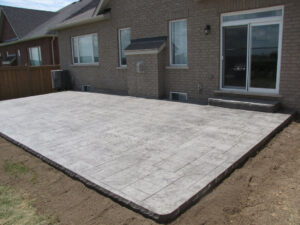Concrete Contractor can offer various constructions, including Stamped Concrete. It is a highly attractive and durable material that can be embossed, textured, or patterned. Depending on the design, it can imitate a variety of different materials. Typically, it’s used on driveways, patios, pool decks, and interior flooring. However, its versatility is not limited to exterior surfaces. You can use it anywhere, from driveways to indoor floors. To get started, learn about the advantages of this material.

You can choose to install stamped concrete on your entryway or driveway, a walkway, or a patio. For residential applications, it’s an excellent choice for driveways, pathways, and entryways. Commercial settings can also benefit from this material’s durable and decorative appeal. For example, it can be used to enhance parking lots, lobbies, and courtyards. You can even use it in theme parks. For both commercial and residential applications, you can choose from a variety of designs, including custom stamps or patterns.
While stamping is a versatile material, it can be expensive. A high-quality finish requires a sealant, which costs between $0.13 and $70 per square foot. A water-based elastomeric sealer is the least expensive option, while acrylic and water-based clearcoats are more expensive. In addition, decorative overlays can be cut to match the design of an existing surface. They can be polished to create a more realistic finish.
Before deciding on a design for your new patio, consider the existing landscape and surrounding properties. While an experienced professional can replicate almost any surface, it’s important to think about the landscape and surrounding area before committing to a design. A qualified company can also show you some of the different designs and colors in the area so that you can make the right decision for your space. There’s a wide variety of stamps and designs available, so you’ll be able to choose the perfect one for your needs.
When it comes to maintenance, stamped concrete doesn’t need to be sealed every year. It only needs to be cleaned and sealed when necessary. While it doesn’t require annual maintenance, you must remember that it will need to be renewed at least once every two to three years, depending on the type of design you’ve selected. The best way to maintain the shine and quality of a stamped concrete surface is to prevent it from being damaged by weather.
The process of stamping concrete requires several steps. First, the concrete is pre-textured. Secondly, the contractor must seal the concrete with an appropriate sealant. Once the sealant is applied, it will protect the concrete from moisture. If the color isn’t as appealing as they want, it may be worth spending more to install a stamping machine. The installation process is also more costly than a standard driveway, so consider the cost before hiring a professional.
If you haven’t already installed stamped concrete, you’re missing out on the beauty of the material. The process can be expensive, but it’s a good investment for your home and curb appeal. In addition to being durable, stamped concrete is easy to clean. After pouring the concrete, it will be smoothed with a 2-by-4 and is easy to maintain. Then, you’ll need to purchase a stamp and press it into the concrete. Then, you can choose a color that complements your house.
The benefits of stamped concrete are many. Its durability is unsurpassed, and it rarely needs to be maintained. But there are a few downsides to stamped concrete. When installed incorrectly, it can cause damage to the concrete. Therefore, it’s essential to hire a professional to prevent this from happening. You can consult a specialist in the field before you start work. Once you’ve found a professional, it will be easy to begin laying down the concrete.
Another advantage of stamped concrete is its cost-effectiveness. Unlike other types of paving materials, it requires little maintenance. Depending on how the material is used, it can last for decades. But do-it-yourselfers will have to be careful, because the material is easily cracked by earthquakes and foundation issues. You may need to reseal it periodically to avoid cracking. It will also need sealing every few years.